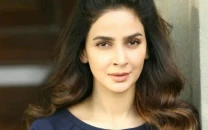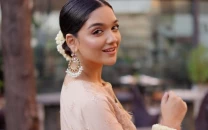‘Qaatil Haseenaon Ke Naam’ looks like a promising psychological drama made in hell
Blood thirsty vamps as anti-heroins are taking centre stage with Meenu Gaur’s six-part anthology on seven women.
1637395933-0/17-lede-Sunday-(1)1637395933-0-640x480.webp)
For some reason, shattering stereotypes on TV has become synonymous with depicting yawn-inducing ‘empowered’ females. While breaking old patterns has set the tone for new clichés. Recycled narratives with the same old undertones and shock inducing gore have assembled into an overdone OTT formula.
But when tackling decades of female subservience – constantly reinforced by the same old sexist narratives on various storytelling mediums – how repetitive is too repetitive?
There is no definite answer to that question. Storytellers are compelled to choose from either ferocity or growing mediocrity; a slap on the face of a vile, treacherous archetype of a woman or a tear in the eye of a damsel in distress. But a female victim-turned-crusader is nobody’s cup of tea; especially not the Pakistani channels’, sponsors’ or audiences’.
Enter ZEE5 with its anti-heroins to break the monotony. Mind you, I am not referring to Churails, a show that single-handedly got the Indian streamer barred in Pakistan. While we loved us some vengeance hungry witches, it’s time for blood thirsty vamps to take centre stage and Meenu Gaur’s Qaatil Haseenas are doing just that.
Albeit, going by the trailer, one may wonder: “Churails 2.0?” There is a list of similarities, ranging from an all-female leading cast to themes of revenge against misogynistic, cheating men and organised anarchy. But contrary to Asim Abbasi’s vigilantes, Meenu’s femme fatales in Qaatil Haseenaon Ke Naam (QHKN) are set to re-write their own destinies in sheer blood. The British-Indian director aims to flip the script on film noir by giving it a desi makeover and a female voice.
“I love noir but I always found it annoying that films belonging to the genre were mostly dictated and narrated by men,” Meenu lamented in response to a question posed during the virtual trailer launch of the series on Thursday. “So while translating it, we made sure that our fatales did not fit into the conventional age bracket or body type deemed ‘heroin worthy’ by men.”
Meenu’s leading ladies include Sanam Saeed, Sarwat Gilani, Mehar Bano, Faiza Gillani, Beo Raana Zafar, Samiya Mumtaz and Eman Suleman. QHKN also features Osman Khalid Butt, Ahsan Khan and Sheheryar Munawar. Co-written by Meenu and Farjad Nabi, it “is endeavouring to pave the way for ‘feminist noir’ in South-Asian cinema,” and as per the director, it tackles the question: “What would you be willing to kill for?”
The trailer sees numerous punchy one liners by each character of the show, as Samiya’s prologue sets the tone for the six-part anthology series that has been tied together by a similar quest. “Khuwahishen dhaagon jesi hoti hain, or dhaagay kahaanion jese,” she says before moving on to warn: “Agar ishq sacha ho, tou ya dil lahu lahu hota hai, ya haath.”
Sanam’s playful Zuvi is also heard saying: “Each one of us wants a picture perfect life. Mine was to have a husband like you, a house like this, my artist studio,” only to be interrupted by a male character, reminding her, and us that “this picture is not perfect.” And neither is film noir or real life.
“I don’t have a temper,” Sanam admits while narrating how her voice shakes when she raises it at the behest of someone pushing her around. “But with my characters, I can express my anger pretty well,” she acknowledges. However, in QHKN, Sanam speaks in a different voice to give her character a sense of vivacity.
“Mehek is a hopeless romantic,” dishes out Sarwat on her character in the show. She goes on to assure that her “disillusioned but fixated” character will transform for the better. In response to a query about the show being any different from her prior hit, Churails, Sarwat ensues, “Churails shed light on the stories of women from a particular, urban setting. Women in QHKN hail from a different time and place. The series interplays between light and darkness.”
Meenu also clarifies that her show will have a much different ‘aesthetic’. However, while resorting to bloodshed may not be the best solution to counter oppression in real life; does the series offer solely a cathartic experience?
When met with a query raised by a press representative about ‘one extreme balancing the other,’ Meenu maintained, “When picking up a genre, we have to give people a taste of it. But such a question will never be fielded by a male director. We have seen so many gangster films and series where men are thrashing each other for no reason so why does nobody bat an eye?” she asks.
Beo also pointed out how there’s a “universal pleasure” in watching the victim win. But “women don’t have to become victims to gain validation or be sympathised with.” Meher chimes in, “I think as women we’re so used to shrinking ourselves to make others comfortable that we need to thank Meenu for not turning us into victims in order for us to come out victorious.”
As for Samiya – the mother of all female protagonists who also starred in Meenu and Farjad’s Zinda Bhaag – QHKN will see her as a “dignified, aged, entitled” woman carrying the legacy of her family. “But there is a lot that happens in her life that transforms her. She goes through an interesting arch” asserts Samiya. While Meher, who played Zubaida in Churails, will be seen as Anarkali in the cynical, hopefully cryptic series that so far, looks promising. “My character is a patakha with a dark past,” she shares.
Faiza, on the other hand, is essaying a woman “past her age, seeking love.” Sheheryar can be seen telling her in the trailer: “Tum aik mamuli, dhalti umar ki, aam shakal ki aurat ho (You’re an ordinary looking, past her prime woman),” and we’re guessing that moment will serve as the turning point for her character development. As for Eman, who did not reveal much about her character, except that she is trying to navigate through life without depending on anyone, shared that “Zehra has cried a lot.”
Nevertheless, here’s hoping QHKN isn’t another run-of-the-mill, grisly looking shallow attempt at depicting unapologetic women because while, “Hell hath no fury like a woman scorned,” William Congreve was also a man and none of us want to watch 7 Khoon Maaf again.
Have something to add to the story? Share it in the comments below.



















COMMENTS
Comments are moderated and generally will be posted if they are on-topic and not abusive.
For more information, please see our Comments FAQ